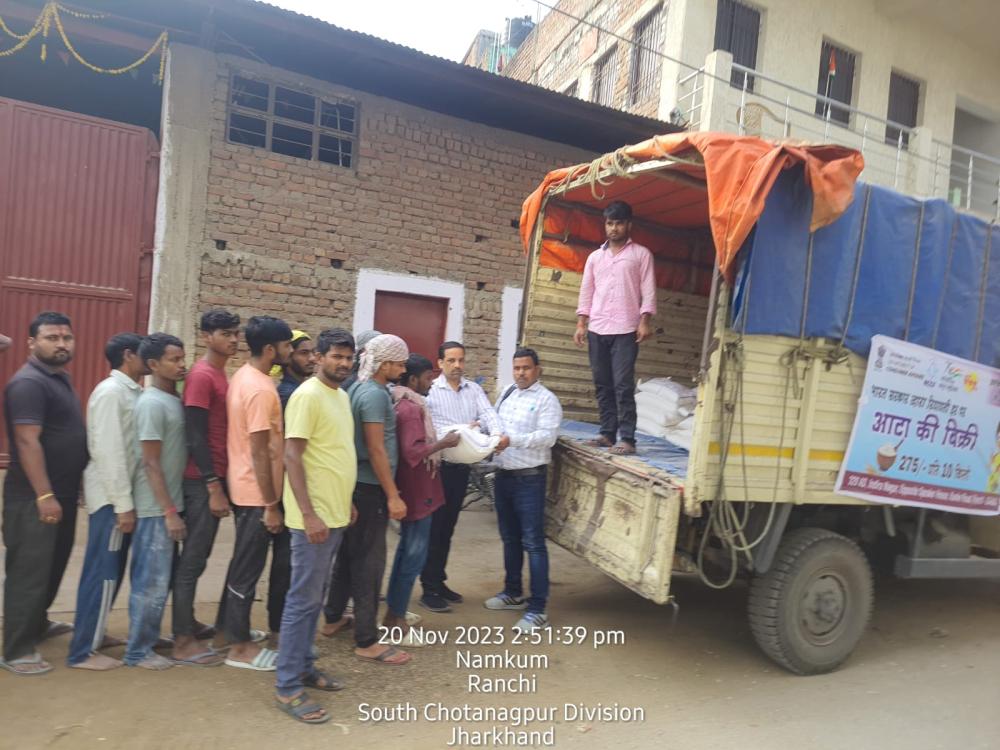
*Pictures show mobile vans selling subsidised Bharat Aata in Ranchi.
Two months back, the Aata was sold at Rs 35-42 per kg at a retail shop. The rate remains the same today at Kanke Road Aata chaki in Ranchi. Even the price of branded AASHIRVAAD Aata has not increased during the past four months.
“We are happy to see there is no rise in wheat flour price”, smiles Abhishekh Kherwal, owner of Mewa Store shop, Kanke Road in the capital city of Jharkhand, echoing sentiments of a dozen Aata sellers contacted by JharkhandStateNews.com to elicit their response.
The stability in the price of Aata(wheat flour) in retail shops across Jharkhand primarily owes to the Union government’s move to offload a quarter of a million tonnes of wheat into the country’s vast food distribution system and offered cut-price whole wheat flour made from it in the run-up to the festival season.
Under the plan, the Centre slashed the price of its Bharat Atta brand to ?27.50 per kg from the existing ?29.50 a kg. This comes against the backdrop of the all-India average wheat flour price rising 4.1% early this year to ?35.84 per kg.
As per official records, the Centre offloaded 250,000 tonnes of wheat to Kendriya Bhandar, National Agricultural Cooperative Marketing Federation of India (NAFED) and the National Cooperative Consumers Federation of India Ltd (NCCF) from its central pool and the semi-government and cooperative organizations and converted it to atta or wheat flour and then started selling it to consumers through various retail outlets at ?27.50 a kg.
This is one among the many initiatives of the Narendra Modi government to keep prices in check. This is being done to send a signal to the market that if the trade does not behave in the right manner, the government is ready to intervene and use its tools.
As per official data available, wheat was offloaded at ?21.50 a kg as usual, and the margins of these agencies were capped at ?5 per kg grinding to flour and packaging. In effect, converting wheat into atta costs around ?1.80 a kg for big millers with a monthly milling capacity of 2,500-3,000 tonnes, and ?2.50 per kg for small millers.
Notably, the Centre early this year announced a scheme to offload 300,000 tonnes of wheat from the Food Corporation of India (FCI) to Kendriya Bhandar, NAFED and NCCF and sell flour as Bharat Atta at ?29.50 per kg to check inflation.
The plan came ahead of the general elections due by March next year. Against this backdrop, the government has continued to offload wheat under the open market sales scheme (OMSS) since 28 June. So far, it has reportedly sold about 5 million tonnes (mt) of wheat to bulk buyers like flour millers and small traders.
In Ranchi, the total allocation of wheat was 3,000 MT.Out of this allotment of wheat by FCI Regional Office was 450 MT. The quantity lifted was 450 MT.Of this quantity of wheat converted to Bharat Aata was 50 MT.
While the sale started in Ranchi on November 20, the quantity of total Bharat Aata sold was 26 MT till November 23. Queries sent to the Centre’s consumer affairs, food and public distribution center remained unanswered at press time.
These measures, however, have not only improved the availability in the market but also helped control food inflation. Even as the sale is still going on, Bharat Aata has gained popularity among consumers as “ Modi( read Prime Minister Narendra Modi) Aata.”